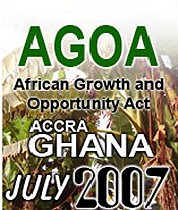2007年VOA标准英语-AGOA Forum Highlights US-African Trade
搜索关注在线英语听力室公众号:tingroom,领取免费英语资料大礼包。
(单词翻译)
By Naomi SchwarzDakar
18 July 2007
The theme of the sixth forum1 on the African Growth and Opportunity Act that opens Wednesday Ghana's capital, is "As trade grows, Africa prospers2." The U.S. initiative allows allows African countries that undertake economic reforms to gain duty free access to the U.S. market. But Naomi Schwarz reports from VOA's regional bureau in Dakar, some say the agreement has changed little in the trade relationship between the U.S. and Africa.
U.S. Deputy Assistant Secretary of Commerce for Africa, Middle East and South Asia Holly3 Vineyard says imports to the United States from sub-Saharan Africa have increased by more than 150 percent during the past six years.

Vineyard attributes the rise, in part, to the African Growth and Opportunity Act, a U.S. law signed by President Bill Clinton in 2000 to encourage trade between the U.S. and sub-Saharan Africa.
Vineyard says trade ministers from countries across the continent are meeting with representatives from the United States on Wednesday and Thursday in Ghana to discuss in detail how to improve trade conditions on the continent.
"We are hopeful that by having these kind of practical how-to discussions, that it will enable and empower more policy makers4 to be able to deal with these issues; it will create greater awareness5 amongst the private sector6 and civil society about how to help those companies improve their ability to get into the U.S. market," she said.
Vineyard points out that topics for discussion will include enhancing production capacity, creating access to financing, developing infrastructure7, and working on quality control.
The largest category of African exports to the U.S. is by far oil and petroleum8 products, leading some African activists9 to criticize AGOA as not really benefiting most Africans.
The program head at the Ghana-based non-governmental organization Third World Network Africa, Tetteh Hormeku, says AGOA has not changed the basic structure of trade between the United States and Africa where African countries export commodities and the U.S. sells processed goods back to them.
"If you are looking at whether or not AGOA has really helped restructure African economies, which by and large are dependent on agricultural products, then AGOA has not helped," he said.
Hormeku notes also that most of the oil produced in Africa is extracted by foreign companies. He says AGOA requirements forbid African governments from subsidizing farmers even though the U.S. government subsidizes its own agricultural sector.
But Dinah Koney, a small businesswoman in Ghana whose company makes and sells wood handicrafts in Ghana and overseas, says she sees hope in the Forum's theme, "As trade grows, Africa prospers."
"As our products are able to sell on the American market then we tend to employ more people back home to do the production," she said. "And these people also have families that they care for, so there is that flow that people are able to take care of their families and it helps Africa in general."
Koney says African companies need to produce at greater capacity in order to take advantage of AGOA's incentives10.
"You should be able to get your products to them in good time, the quality should be the same," she said. "But if you are going to take about three months to produce an order then it does not make sense. It is not profitable for them. Then they tend to look outside Africa."
Currently 39 countries in sub-Saharan Africa meet the conditions to qualify for special treatment under AGOA.
 收听单词发音
收听单词发音 




